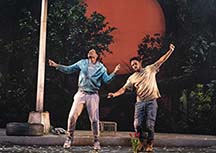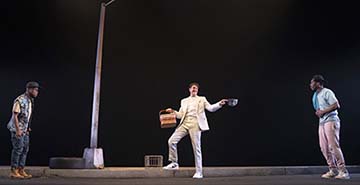
Lucy Komisar
|
“Pass Over,” a surreal satiric chilling view of ghetto’s desperate young men “Pass
Over.” Antoinette Chinonye Nwandu’s “Pass Over” is a surreal satiric funny biting clever horrific vision of what life is like for two young black men living in a ghetto whose borders are so fixed they can only dream of getting out, of “passing over,” only one of the meanings of the play’s title.
The psychology of these members of the brutalized black underclass is riveting in its portrayal. A self-satisfied white pseudo-liberal is deftly skewered. Centuries of history are vividly encapsulated. All with smart, tough direction by Danya Taymor. The young men are in their 20s, agile, still good-humored, even hopeful. One is named Moses (Jon Michael Hill), the other Kitch (Namir Smallwood). Their performances run from pathos to comedy, always self-aware and encompassing the human condition of their bleak corner of the world. The play takes inspiration from Beckett’s “Waiting for Godot” and the story of Exodus. The scene is bare except for a high street light, a tire, a tin barrel, a low seat that looks like an old toilet bowl. Suddenly a bright light shines, and they are terrified. It could be the police. When they are momentarily safe, they go back to their favorite pastime, fantasy dreaming.
They imagine having caviar and fancy cars, a penthouse, dialing room service with upper class accents, soft sheets, not being killed by the popos (the police). Kitch sings “Somewhere over the rainbow…” “Pass Over” makes an analogy with the plagues that hit Egypt and passed over the Israelites. These guys are as desperate to get out as the Israelites were to flee. The other Moses didn’t get to the promised land, will this one? They are confronted by two “whites,” played by Gabriel Ebert, as if two sides of the same coin. They are suspicious when the gangly man in a white suit arrives: white men in the neighborhood are either police or Mormons. He’s a giggly “golly gee” guy. After a while we realize he’s a certain kind of white liberal. He’s come with a picnic basket. When he wants to share food, he pulls from the bottomless clown car-style receptacle a huge assortment of comestibles, including a whole chicken, bottles of wine, dim sum, four kinds of berries and collard greens and pinto beans, of course his favorite. A wonderful parody of liberals bearing gifts, he will give them a few bites and repack most of the food.
Meanwhile, from the start, every other word Moses and Kitch speak to each other is the N-word. The man asks why. They try to get him to say it. He refuses. His mother told him never to say the N-word. He plays a banjo. “I see trees of green…red roses too…what a wonderful world!” They join him in a vaudeville routine. There are other terrific choregraphed movements in their fights and jazzy high steps. What is the white guy’s name? “Master. My name is Master.” They object. He says, “I’ve never heard it quite like that before. That is so awkward. It’s just a family name.” He strums, “Let my people go.” Moses has a thought, suppose they behaved like whites. He tells Kitch, “Let’s give the N word up. Maybe stop saying that shit.” They begin to talk in a more educated fashion, they imitate Mister. Then satire turns to gut-wrenching brutality. A cop (Gabriel Ebert) arrives. He is jokingly called Ossifer in the playbill. Moses and Kitch are playing white. He declares, “Word of warning, dangerous fellows on the loose around these parts. I’ll protect you both. This place ain’t as great as it used to be.”
Then one reverts to the street talk N-word. Swiftly the cop picks up his gun, orders, “hands behind your heads.” He demands, “Who are you?” Moses replies in rote, “A stupid lazy violent thug.” The cop says, “Good.” Later, Kitch lists people they knew murdered by police. Now, they see only one way out. A red flower sprouts. Is that a clue to paradise? Moses says, “We ain’t chosen, we Egypt. That river don’t part for us.” Pass Over takes on another meaning. The cop won’t escape the plagues. But is this where the threat began? A white guy approaches paradise, arms outstretched with bling, the snake in the garden. This Nwandu-Taymor theatrical event, with its superb acting, is a fitting tribute to Beckett.
Visit Lucy’s website http://thekomisarscoop.com/ |
| museums | NYTW mail | recordings | coupons | publications | classified |




